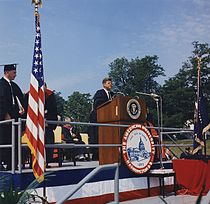
| ||
|---|---|---|
|
35th President of the United States
Tenure
Appointments
Presidential campaign Assassination and legacy
 |
||
The American University speech, titled "A Strategy of Peace", was a commencement address delivered by United States President John F. Kennedy at the American University in Washington, D.C., on Monday, June 10, 1963.[1] Widely considered one of the most powerful speeches Kennedy delivered,[2] he not only outlined a plan to curb nuclear arms, but also "laid out a hopeful, yet realistic route for world peace at a time when the U.S. and Soviet Union faced the potential for an escalating nuclear arms race."[3] In the speech, Kennedy announced his agreement to negotiations "toward early agreement on a comprehensive test ban treaty" (which resulted in the Nuclear Test-Ban Treaty) and also announced, for the purpose of showing "good faith and solemn convictions", his decision to unilaterally suspend all U.S. atmospheric testing of nuclear weapons as long as all other nations would do the same. Noteworthy are his comments that the United States was seeking a goal of "complete disarmament" of nuclear weapons and his vow that America "will never start a war".
The speech was unusual in its peaceful outreach to the Soviet Union at the height of the Cold War, and is remembered as one of Kennedy's finest and most important speeches.
Soviet Premier Nikita Khrushchev liked this speech so much that he ordered its full Russian translation published in Pravda and Izvestia, which was unprecendented at that time.[4]
- ^ "American History TV | Series | C-SPAN.org". series.c-span.org. Retrieved May 19, 2020.
- ^ Mufson, Steve (August 4, 2015). "Obama will echo Kennedy's American University nuclear speech from 1963". The Washington Post. Retrieved 6 August 2015.
- ^ Wang, Joy Y. (August 4, 2015). "Obama to follow in John F. Kennedy's historic footsteps". msnbc.com. Archived from the original on 3 August 2016. Retrieved 6 August 2015.
- ^ Джон Кеннеди, наш западный партнер

